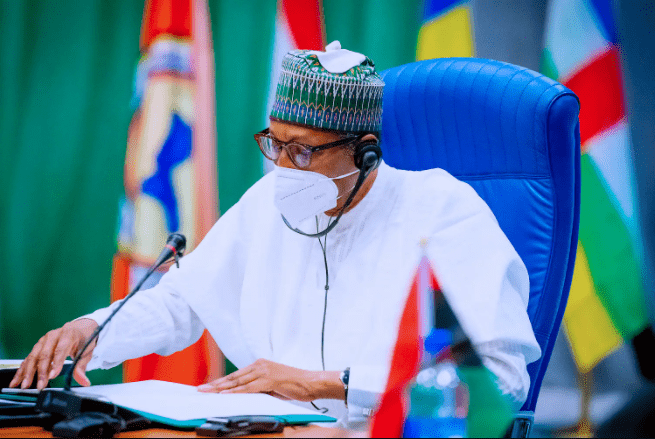
President Muhammadu Buhari says Nigeria loses about 26.3 billion dollars annually to various forms of criminality particularly piracy and sea robbery.
Buhari disclosed this while performing the inauguration of Falcon Eye Project, Nigerian Navy’s Strategic Maritime Surveillance System, on Tuesday at the Naval Headquarters, Abuja.
Represented by Vice President Yemi Osinbajo, Buhari said that securing Nigeria’s shipping lanes was crucial to the nation’s economic interests.
“Why is this project so important to us as a nation?
“The maritime industry occupies a prominent position in the matrix of our vital economic interests and it encompasses activities ranging from fishing and resource exploration to marine research and shipping among other endeavours.
“Of all these activities, shipping stands out as a critical link in Nigeria’s international trade engagements because it is the cheapest and most efficient means of moving large volumes of goods.
“Given our economic aspirations and our commitment to international trade, ensuring the security of shipping lanes within, and proximate to our waters, is in our national interest.’’
According to him, Nigeria’s hydrocarbon resources which are largely domiciled in our maritime environment remain the mainstay of Nigeria’s economy.
“It accounts for 55 per cent of our GDP, 95 per cent of our export earnings, and about 70 per cent of government revenue.
The president said that in recent years, some threats within Nigeria’s maritime environment had taken more harmful dimensions to the economy and even the safety of citizens and commercial entities which used the maritime domain.
“These include, piracy, armed attacks on ships, kidnapping for ransom, crude oil theft, smuggling, as well as Illegal Unregulated and Unreported Fishing (IUU).
“It is estimated that Nigeria loses about 26.3 billion dollars annually to various forms of criminality particularly piracy and sea robbery.
“On account of the escalated risks in some of our maritime areas insurance premiums for commercial vessels coming to these areas have risen sharply making maritime trade an unattractive proposition.
“This underscores the need to enhance our maritime security architecture; consequently, a critical contribution of the Falcon Eye System will be the provision of actionable intelligence for curbing maritime threats to our economy.’’
Buhari said that his administration had demonstrated a clear commitment to building the capacity of Nigeria’s strategic institutions to secure its coastal waters and the precincts of its maritime neighbourhood.
He said that on June 24, 2019, he assented to the Suppression of Piracy and other Maritime Offences Bill.
“By this Act, Nigeria became the first country in the West and Central African Sub-Regions to promulgate a stand-alone law against piracy, which is an important international requirement, set by the International Maritime Organisation as part of measures to guarantee secure global shipping.
“The Act provides the much-needed legal and institutional framework to improve maritime security and ensure safe and secure shipping in Nigerian waters.
“Last year, we commenced prosecution and secured our first convictions under this law,’’ he said.
Earlier, Chief of Naval Staff, Rear Admiral Awwal Gambo, said that the president’s presence at the event reaffirmed his unflinching support to the Nigerian Navy’s endeavour at ensuring a secure maritime environment for legitimate economic activities.
He said the project arose out of the need for national maritime security architecture that would leverage modern technology to enhance the safeguard of the immense hydrocarbon, living and other mineral resources in the nation’s maritime domain.
In his remarks, National Security Adviser Babagana Monguno said the project was borne out of the necessity to combat the myriad of security problems within the maritime sector.
He said that the contract was signed in 2014 and designed to provide Nigeria with effective surveillance capability of its entire maritime domain.
